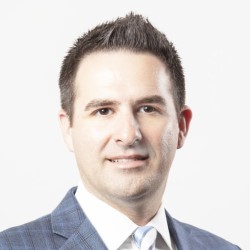
Seger S. Morris, DO, MBA, CPE, FACOI, FACP
Division Chief of Mississippi Internal Medicine Program and Program Director of the Internal Medicine Residency at Baptist Memorial Hospital-North Mississippi; Regional Assistant Dean and Director of Health Policy Programs for William Carey University College of Osteopathic Medicine
— MEDICAL SCHOOL —
Lincoln Memorial University DeBusk College of Osteopathic Medicine
— RESIDENCY —
Magnolia Regional Health Center Internal Medicine Residency
What is your current position?
I am the Division Chief of Mississippi Internal Medicine Programs and Program Director of the Internal Medicine Residency at Baptist Memorial Hospital-North Mississippi. Additionally, I serve as Regional Assistant Dean and Director of Health Policy Programs for William Carey University College of Osteopathic Medicine.
Where did you attend medical school and postgrad training?
Lincoln Memorial University DeBusk College of Osteopathic Medicine, and Magnolia Regional Health Center Internal Medicine Residency.
Why did you choose to become a physician?
At its core, this decision was made because I truly enjoy helping people. I am the 15th osteopathic physician in my family, so, when I decided in my mid-20s to pursue more fulfillment in my career, the choice to help people through health care felt natural.
What field of internal medicine did you select and why?
I have practiced in both the ambulatory and inpatient settings, but gravitate toward the inpatient setting. I enjoy the acuity and fulfillment of helping patients recover from acute illness, and the challenges of problem solving in the acute setting.
Please describe a typical day in your practice.
I am an academic internal medicine physician with about half my time spent clinically and half in administrative/academic roles. When working clinically, I arrive to the hospital early to ensure I have a good handle on the day ahead. Then, I review the EMR to learn about any overnight events related to our patients. At 8:00 a.m., I lead table rounds with our academic hospitalist service, teaching medical students and resident physicians prior to our multidisciplinary bed huddle at 9:00 a.m. Following bed huddle, I lead bedside rounds with our group until 10:30 a.m.; then, we separate and I see the remaining patients individually. From noon to 2:00 p.m., I participate in or lead academic sessions and/or meetings while eating lunch, then treat new patients in the afternoon until handing off to our academic nocturnist at 7:00 p.m.
What are some of your special interests professionally?
I am very interested in advancing the physician workforce and the osteopathic profession through professional advocacy and health policy, particularly growing physician-led patient care teams in rural areas.
What are your interests and hobbies outside of medicine?
Family, friends, golf, watching all sports, and business/investing.
What advice would you like to share with medical students, or what do you wish someone would have told you while you were in medical school?
My grandfather told me before I started medical school that if I completed medical school and did right by my patients, I'd always have a job and a way to care for my family. I find myself reflecting on this wisdom and the subtle, yet profound responsibilities that lie in this statement. To “do right by my patients,” to me, means that there's more to patient care than just understanding the science of disease. So, whether you're a DO or an MD, I encourage you to pursue a holistic approach to patient care.
Which talent would you most like to have?
I wish I could sing well. I love music and the emotional connection I have with it. And, I love to sing—it's just not good for others to be around when I do so.
If you could change one thing about yourself, what would it be?
Sometimes, the analytical part of my personality holds me back from simply “taking a swing” at opportunities.
What do you consider your greatest achievement?
Graduating medical school. Frankly, it was hard for me; and, after I finally overcame (or harnessed) the things that were holding me back, I was able to accomplish what is still the most difficult goal I've achieved.
What is your most treasured possession?
In the words of my father, “Never get emotionally attached to inanimate objects.” I treasure my family more than anything, though they certainly are not possessions.
Back to the August 2022 issue of ACP IMpact
More I.M. Internal Medicine Profiles

